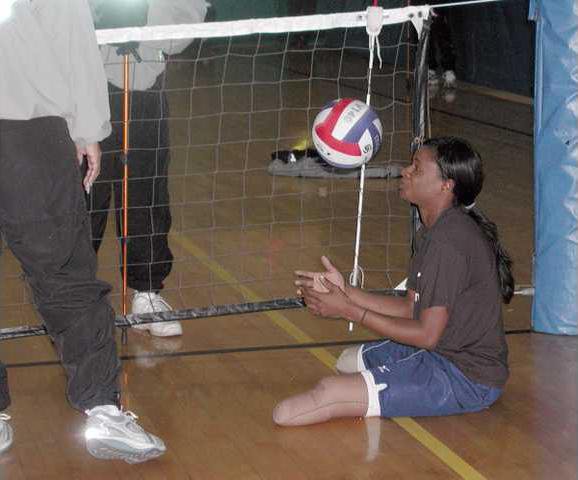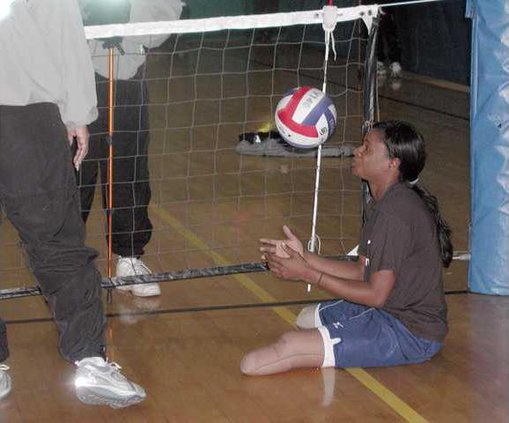Paralympic swimmer Jarrett Perry gently coaxed a seasoned, but hesitant, combat veteran to put his face in the water and blow bubbles at Fort Stewart’s Newman Gym pool. The wounded warrior commented to his cadre members he wasn’t afraid to shoot an enemy during a firefight, but found conquering his fear of swimming to be a formidable personal challenge.
Perry and other paralympic athletes and coaches from the U.S. Paralympics based in Colorado Springs, Colo., visited Fort Stewart’s Warrior Transition Battalion Thursday and Friday, to conduct adaptive sports training and games, including swimming, sitting volleyball and wheelchair basketball.
Perry, along with U.S. Paralympic swim coach Alicia Kendig and recreational therapist Cindy Burkhour, trained injured soldiers and their cadre in the pool. Burkhour said she and Kendig have worked with wounded warriors across the country. The two also train WTB squad leaders and therapists, helping them establish adaptive sports programs.
"Our whole mission is not to look for the next paralympic athlete, but to help soldiers," Burkhour said.
"The aquatic environment can be intimidating," Kendig said. "We introduce it in a different light."
Burkhour said balance can be an issue for soldiers suffering from PTSD and traumatic brain injuries. Because water "has no gravity" it can help soldiers develop better balance and "free those with spinal and limb injuries," she said.
"It’s great to see these guys getting down on the floor, learning the game and having fun," U.S. Paralympic sitting volleyball coach Blake Elliott said. "I was here a year ago when the U.S. Paralympic team came out to do a train-the-trainer event."
Blake said he could tell a soldier’s level of enjoyment by how sweat-soaked their shirt became during play. The coach said he is based at the University of Central Oklahoma, where 12 paralympic athletes live on campus and train daily. Blake said his organization is focused on promoting sitting volleyball. The game is growing, particularly in the military community, he said.
"We’ll do anything to get their competitive fire re-lit," said WTB commander Lt. Col. Bill Reitemeyer.
Reitemeyer said the two-day intensive sports training was only one opportunity born of the battalion’s evolving adaptive sports program.
WTB chief occupational therapist Debra DeHart said adaptive sports helps strengthen soldiers physically, reduces stress and offers positive reinforcement. Once a soldier is screened by his or her medical providers and given the okay to participate, they can show to themselves and others what they can do, not what they can’t do, DeHart said.
Army National Guardsman Spc. Marvin James, 39, praised the battalion’s rehabilitative programs, including the adaptive sports program. James said his father, a Vietnam veteran, didn’t have the same opportunities as he does now. The guardsman out of Macon was wounded in Afghanistan nearly one year ago. He is attending college classes while assigned to the battalion, so he can find work in advertising or entertainment once he leaves the service. James had never tried volleyball before Thursday, and despite pain in his back and legs was determined to participate, he said.
The program also helps builds camaraderie among the battalion’s 340 soldiers, who come to the WTB from different Army units, from the National Guard and Army Reserves, DeHart said. Most have little in common except for their injuries, she said.
Reitemeyer, who tried his hand at wheelchair basketball, said adaptive sports levels the playing field.
Introducing paralympians to injured soldiers also inspires them, he said.
"When you get to meet a paralympian (like sitting volleyball champion Carrie Miller) who’s missing her legs, it’s real humbling, too," Reitemeyer said.
DeHart said 16 WTB soldiers have applied to play in this year’s Warrior Games. She said the battalion is waiting for word on who "made the cut."
The second annual Warrior Games will be May 15-21 at the Olympic Training Center in Colorado Springs, Colo. Paralympic athletes from all branches of the service will compete in shooting, swimming, archery, track and field, cycling, sitting volleyball and wheelchair basketball. One-hundred soldiers from 9,000 potential competitors will be selected to represent the Army, according to www.defense.gov.
Last year, three wounded warriors from Fort Stewart competed in the 2010 Warrior Games. Former WTB soldier Cpl. Ryan Shurtleff won one silver and one bronze medal.
DeHart said the battalion recently acquired new adaptive sports equipment, such as three hand cycles, archery sets, specialized wheelchairs for wheelchair basketball and air rifles and pistols. Reitemeyer said the battalion also offers an adaptive martial arts program.

